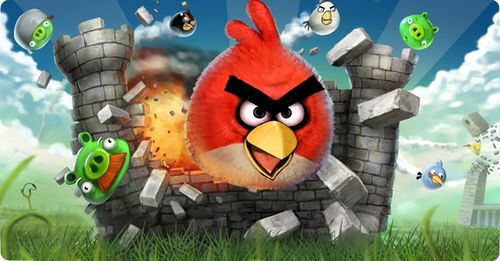
Ever since I got my iPhone, I’ve been hopelessly devoted to Angry Birds, along with about 75 million other people.
75 million!
That’s 75 million playing a game on their smartphone.
That’s more than the whole population of Britain all playing Angry Birds.
Wow!

How did that happen and what’s it got to do with banking?
Well, the story is covered in depth by Wired Magazine this month, and it’s fascinating stuff.
The whole history of Rovio, which means “bonfire” in Finnish, is fascinating.
Rovio is the Finnish company that created Angry Birds and redefined the gaming industry.
And it’s relevance to banking is that every day 200 million minutes – or 16 years per hour – is spent playing the mobile game. It is the number one best seller on iTunes in 68 countries, as well as the best-selling paid app of all time.
In total the brand has taken over $70 million in revenues for a game that cost just $150,000 to develop.
And it starts at a cost of just 59 pence ($0.90) to download.
That’s the relevance to banking.
Money.
Little bits of money that, combined, make millions and billions of dollars.
There are millions of sub-$1 downloads taking place worldwide every second now.
So that old idea of paying $0.50 to read a page of a newspaper was the fallacy of a decade ago when we talked about micropayments.
That's Rupert Murdoch's dream, but it's a lame one if you ask me.
Paying $0.50 for a game that entertains for weeks ... that's real value.
And the stats column along the bottom of the Wired article gives me the ammunition I’m looking for as to why gaming and apps are a key area for future revenues sources:
- For the initial outlay of $150,000 to develop Angry Birds, Rovio has seen 40 million downloads on the iPhone, iPod Touch and Android;
- The average iPhone user spends $4.37 per month in the App Store (Gigacom);
- $2.11 billion will be traded in virtual goods this year in the USA alone (Inside Virtual Goods);
- There will be 970 million app users (Research2Guidance) and 1.82 billion smartphones worldwide by 2013 (Gartner);
- Mobile gaming will be worth about $4.5 billion in 2013 (Electronic Arts), whilst the app economy is estimated to be worth about $30 billion by 2015 (Juniper Research);
- 59% of smartphone owners have downloaded at least one app in the last month (Nielsen);
- 26% of apps downloaded in 2010 on all operating systems were played just once (Localytics); and
- Apple takes 30% of all app revenues and downloads from iTunes.
The article talks extensively about the Rovio business model, how they started, their errors and opportunities, lessons and learning’s.
It talks about Angry Birds being more than a game now, with soft toys and YouTube and other reach.
It talks about the fact that Angry Birds popped up in an ad for Rio, a new movie, during the Superbowl this year.
That's serious stuff, as each advert during the Superbowl costs $3 million for 30 seconds.
So finally, if you’re thinking this is irrelevant, take note of this quote from Rovio’s CEO Mikael Hed:
“We’re building an integrated entertainment franchise where merchandising, games, movies, TV, cartoons and comics all come together. Like Disney 2.0.”
That's why I'm banking on Angry Birds ... or rather, I'm banking on apps to be exact.
Chris M Skinner
Chris Skinner is best known as an independent commentator on the financial markets through his blog, TheFinanser.com, as author of the bestselling book Digital Bank, and Chair of the European networking forum the Financial Services Club. He has been voted one of the most influential people in banking by The Financial Brand (as well as one of the best blogs), a FinTech Titan (Next Bank), one of the Fintech Leaders you need to follow (City AM, Deluxe and Jax Finance), as well as one of the Top 40 most influential people in financial technology by the Wall Street Journal's Financial News. To learn more click here...

